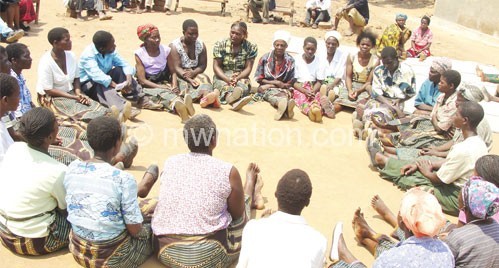Mzimba women in men’s circles

It appears days a Ngoni woman was considered a second-class citizen are finally on the wane. Now women in Mzimba attend mphala, the gatherings where village heads and elders settle disputes and discuss serious issues concerning the entire village.
This is not all for likes of Stiffel Mkandawire. The resident of Simon Mphepo, T/A Mabulabo, is one of the women who hold prominent positions in the village councils, a breakthrough long considered unheard of among the Ngonis, a warring tribe scattered in the vast district and parts of Ntcheu, Balaka and Mwanza.
“At first, I couldn’t believe that a woman can have a chair in what used to be a men’s assembly, but my doubts were strikingly shattered when I was elected as secretary of the meetings,” says Mkandawire of the job which entails putting in writing highlights of the meetings which used to end at talking the talk.
Her writings give the whole village a firm basis for follow-ups, implementation and accountability when it comes to its resolutions.
She fondly remembers taking part in settling a heated land dispute in the village, saying land wrangles sometimes spark fiery furry that blows, pangas and kicks fly in the middle of village court sessions.
This may be among the reasons some people think that mphalas are no-go zones for women who are generally misperceived to be feeble-hearted, but she says the case in point was an eye-opener because women often suffer a lot of justice when it comes to ownership of land and property.
A culture of property grabbing endures—with some parents restricting their daughters’ access to land allegedly because they received cows or cash as lobola. A woman belongs to he who paid lobola, Ngonis believe. But when death strikes, his next of kin sometimes deny a widow and orphans the right to inherit land, arguing: “Your parents named a price and got all they wanted.”
Apart from ensuring that women take part in public life, Mkandawire says her main job is making sure justice flows like a river on gender-based cases.
“It’s exciting that women are taking part in making justice flow like a river, including land issues and cases of gender-based violence which used to be biased against women because the courts were purely a men’s clubs.”
Proverbially, mice no longer look up to cats for justice. But this did not come easy.
According to Group Village Head Mkondanyifwa Honde, it is a result of relentless lobbying by advocacy committees established and trained by the Church and Society of the CCAP Synod of Livingstonia last year
“As Ngonis, we always believed women are meant for the kitchen, not public meetings,” says Honde. “But we have had to soften up because the advocacy committees put up a persuasive case why involving women at all levels, even in decision-making positions, matters.”
The traditional leader also credits the advocacy groups with increased dissemination of development information, saying the cases of gender-based violence reported to his court have drastically gone down since they started sensitising people to gender equality messages.
He said: “Even children are realising their rights and violent men are afraid of abusing women because the incidents are reported and dealt with accordingly, even if it means reporting the matter to police.
For Village Head Billy Nhlane of Yobe Village, women rights and participation signals an awakening for a society that once did not know where to go and what to do even on rights violations emanating from Kanyika Niobium Mine emerging in their midst.
“We didn’t know our freedoms and duties, what they meant and how to exercise them. We thought it was normal to treat women as lesser beings during village courts and development meetings. We thought they had exchanged their voice with dowry,” says Nhlane.
Besides improving the delivery of primary justice, the committees are empowering target communities to speak out and get their voice heard as government and Globe Metals Limited envisage extracting niobium, uranium and zircon at Kanyika.
As uncertainty lingers on the commencement of the mining, the communities are pressing hard for the Ministry of Mining to lift the veil of secrecy on the project: Are compensation and resettlement packages non-negotiable? When will households lying in the way of the project relocate? How does the mining firm intend to invest in surrounding communities likely to suffer social and environmental impacts of increased activity and money circulation? Will they leave health facilities far apart and schools as dilapidated as they are?
Traditional Authority Mabulabo says the issues have gone down as government and Globe Metals are negotiating a development plan at Capital Hill.
For Mkandawire, this is a dream come true.
“With information, we have a voice to approach relevant people not as beggars, but demanding answers and solutions to itchy issues,” says the highest woman in Honde’s chief’s council.





